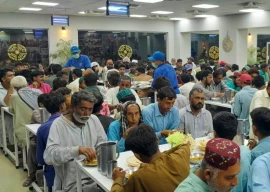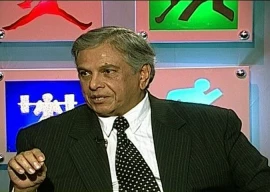
Inadequate investigation, conflicting statements of witnesses and a lack of substantial documentary proof are key reasons behind the acquittal of five convicted terrorists from the Peshawar High Court last week. A special bench is hearing all pending appeals against convictions and acquittals at the high court.
There have been instances when terrorists were convicted by anti-terrorism courts (ATC), but were subsequently freed after their legal representatives argued their way through appeal petitions. On one occasion, a bench comprising Justice Abdul Latif Khan and Justice Syed Asfar Shah expressed its reservation over the police investigation and termed the evidence inadequate for upholding the sentences of the convicts.
Although a plethora of charges were slapped on and piles of documents were brought against them, detailed hearings identified numerous loopholes in the investigation and ambiguities in the evidence stacked up. The police and state lawyers could do nothing but wave goodbye to the convicts.
‘Infertile’
Saddam and Sherpao were arrested on September 18, 2013 while transporting 77 bags of fertiliser from Kohat to Bannu. They were booked under sections 4 and 5 of the Explosive Substances Act
and Section 7 of Anti-Terrorism Act.
The police report stated fertiliser was being transported for the purpose of manufacturing explosives. The ATC sentenced both the detainees to 28 years in prison. The judgement had also mentioned the two convicted men had connections with a militant outfit.
During the appeal hearing, their counsel Shahid Naseem said the police could not establish the link between transporting fertiliser and manufacturing explosives through documentary proof. Naseem argued that an “intelligence report”, which went missing from the police records, led to their arrest.
Another inconsistency was unearthed when the bomb disposal unit head Akbar Khan’s statement contradicted the police report. Khan said only one sample of fertiliser was obtained while the report stated 12 sealed samples were taken.
Additional Advocate General Qaiser Ali Shah told the court the fertiliser contained 1,890 kilogrammes of calcium chloride, which is an important raw material for explosives. However in the absence of substantial evidence that could establish the link, Qaiser had no answer to the cross examination of Justice Syed Asfar Shah. Ultimately, Saddam and Sherpao emerged as free men.
Dubious report
Another example of cases with loose ends is that of Mumtaz. He was arrested on charges of possessing explosive material and sentenced to 14 years in prison.
Mumtaz’s counsel Saeed Khan told the court that police had arrested Mumtaz and Muhammad Sharif from the same spot on similar charges but sentenced the former and acquitted the latter. Khan added the police report contained no information as to where the explosives were recovered from. The counsel argued seven men lived in the same house but cases were registered against two only. In the end, Mumtaz walked free.
Legal binding
“The law tells the investigation officers to conduct their search on the spot and get the witnesses to sign their statements,” lawyer Bashar Naveed told The Express Tribune. “Unfortunately, our police prefer to work inside the comfort of their offices.” Officials who do not even visit the crime scene tabulate reports and present witnesses, he added. “Their lethargy adds weight to the convict’s case,” said Naveed.
Published in The Express Tribune, February 2rd, 2015.
COMMENTS (1)
Comments are moderated and generally will be posted if they are on-topic and not abusive.
For more information, please see our Comments FAQ

























1714024018-0/ModiLara-(1)1714024018-0-270x192.webp)









So proved...Political failures + Judiciary failures = military courts.